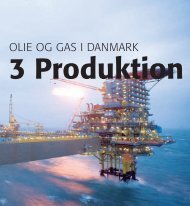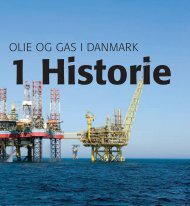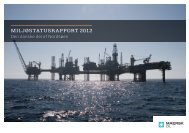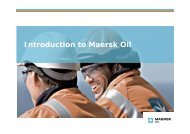Environmental statement - Flyndre and Cawdor - Maersk Oil
Environmental statement - Flyndre and Cawdor - Maersk Oil
Environmental statement - Flyndre and Cawdor - Maersk Oil
Create successful ePaper yourself
Turn your PDF publications into a flip-book with our unique Google optimized e-Paper software.
Accidental Events<br />
Issue Legislation Regulator <strong>and</strong> Requirements<br />
<strong>Oil</strong> pollution<br />
emergency<br />
planning<br />
(Installations)<br />
Offshore Installations (Emergency Pollution<br />
Control) Regulations 2002 (as amended by the<br />
Energy Act (Consequential Modifications)<br />
(Offshore <strong>Environmental</strong> Protection) Order<br />
2010)<br />
Offshore Chemical Regulations 2002 (as<br />
amended 2011) (as amended by the Energy<br />
Act (Consequential Modifications) (Offshore<br />
<strong>Environmental</strong> Protection) Order 2010)<br />
Offshore Petroleum Activities (<strong>Oil</strong> Pollution<br />
Prevention <strong>and</strong> Control) Regulations 2005 (as<br />
amended 2011)(as amended by the Energy<br />
Act (Consequential Modifications) (Offshore<br />
<strong>Environmental</strong> Protection) Order 2010)<br />
Regulator: DECC<br />
<strong>Flyndre</strong> <strong>and</strong> <strong>Cawdor</strong> <strong>Environmental</strong> Statement<br />
Appendix A - Register of <strong>Environmental</strong> Legislation<br />
In the event of an incident or accident involving an offshore installation where there may be a risk of significant pollution of the marine<br />
environment or where the operator fails to implement effective control <strong>and</strong> preventative operation the Government is given powers to<br />
intervene.<br />
DECC under agreement with MCA will notify Secretary of State Representative (SOSREP) in the event of an incident if there is a threat of<br />
significant pollution into the environment. The SOSREP’s role is to monitor <strong>and</strong> if necessary intervene to protect the environment in the<br />
event of a threatened or actual pollution incident in connection with an offshore installation.<br />
The Energy Act 2008 (Consequential Modifications) (Offshore <strong>Environmental</strong> Protection) Order 2010 amends the Offshore Installations<br />
(Emergency Pollution Control) Regulations 2002 to ensure that the powers of the Secretary of State to prevent or reduce accidental<br />
pollution extend to accidents resulting from CCS.<br />
These Regulations require all use <strong>and</strong> discharge of chemicals at offshore oil <strong>and</strong> gas installations to be covered under a permit<br />
system. Exceedance of discharge limits must be reported.<br />
Amendments to the Offshore Chemicals Regulations 2002, made under Schedule 2 of the Offshore Petroleum Activities (<strong>Oil</strong> Pollution<br />
Prevention <strong>and</strong> Control) Regulations 2005 (OPPC) increase the powers of DECC inspectors to investigate non‐compliances <strong>and</strong> risk of<br />
significant pollution from chemical discharges, including the issue of prohibition or enforcement notices.<br />
Under these Regulations it is an offence to make any discharge of oil other than in accordance with the permit granted under these<br />
Regulations for oily discharges (e.g. produced water). However, it will be a defence to prove that the breach of permit arose from an<br />
event that could not be reasonably prevented.<br />
Permits now extend to pipelines under the 2011 amendments <strong>and</strong> to carbon sequestration activities under the Energy Act<br />
(Consequential Modifications) (Offshore <strong>Environmental</strong> Protection) Order 2010.<br />
OSPAR Recommendation 2010/18 OSPAR recommendation 2010/18 on the prevention of significant acute oil pollution from offshore drilling activities came into force on<br />
24 th September 2010.<br />
<strong>Oil</strong> pollution The Merchant Shipping (Implementation of<br />
Ship‐Source Pollution Directive) Regulations<br />
According to OSPAR recommendation 2010/18, contracting parties should:<br />
Continue or, as a matter of urgency, start reviewing existing frameworks (i.e. the regulatory mechanisms <strong>and</strong> associated<br />
guidance applied by the Contracting Parties in the OSPAR area), including the permitting of drilling activities in extreme<br />
conditions. Extreme conditions include, but are not limited, to, depth, pressure <strong>and</strong> weather<br />
evaluate activities on a case by case basis <strong>and</strong> prior to permitting.<br />
EC Directive 2005/35 on ship‐source pollution <strong>and</strong> on the introduction of penalties for infringements states that ship‐source polluting<br />
discharges constitute in principle a criminal offence. According to the Directive this relates to discharges of oil or other noxious<br />
A ‐ 28 D/4114/2011








